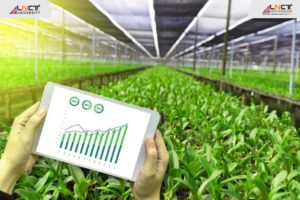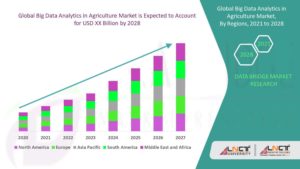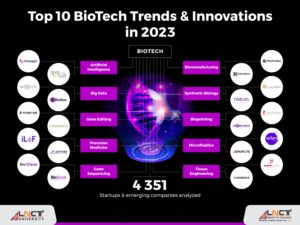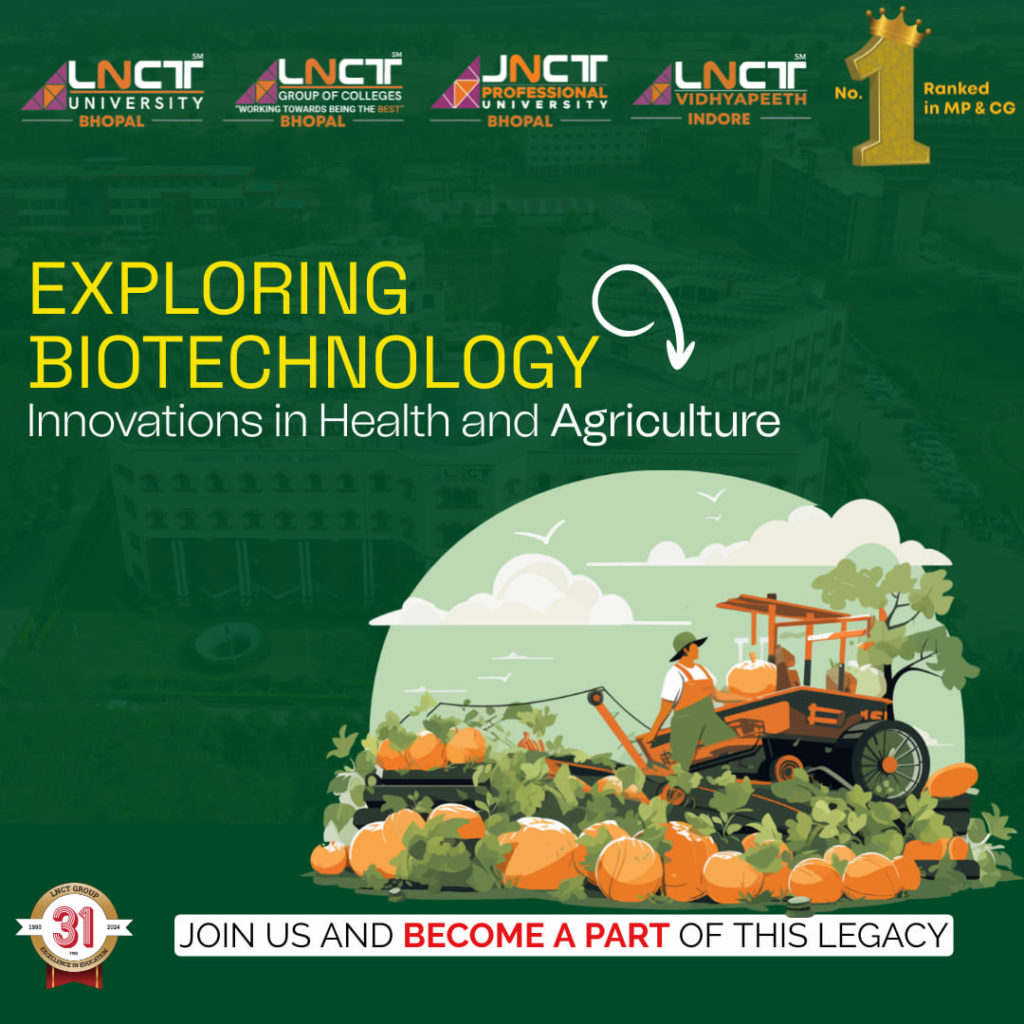Index –
- Introduction
- Biotechnology in Health
- Biotechnology in Agriculture
- Biotechnology in Environmental Sustainability
- Ethical and Social Considerations of Biotechnology
- Future Prospects and Challenges
- Conclusion
Introduction –
Biotechnology has brought about a paradigm shift in terms of health in the diagnosis, treatment, and prevention of diseases. From groundbreaking therapies that revolutionize medical treatments to sustainable agricultural practices that enhance food production, biotechnology is driving unprecedented progress.
Cutting-edge techniques such as gene editing, synthetic biology, and personalized medicine are reshaping the landscape of healthcare, offering targeted and precise interventions. We will unravel the mysteries behind these technologies and discover how they are improving patient outcomes, extending life expectancy, and challenging the boundaries of human well-being.
Our exploration will uncover the potential of these advancements and their implications for global food security.
We will explore the ethical considerations that arise with these transformative technologies and engage in discussions about the societal impact of biotechnology innovations.
This exploration of biotechnology will provide you with a comprehensive overview of the latest developments and the potential biotechnology holds for students and professionals alike for shaping our world.
Biotechnology in Health: Transforming Lives with Science
Biotechnology in health, where scientific breakthroughs are changing lives in extraordinary ways.
At its heart, biotechnology in health harnesses the power of nature and our understanding of biology to develop innovative solutions for disease prevention, diagnosis, and treatment. It’s a field that blends the awe-inspiring intricacies of living organisms with cutting-edge technology to unlock the secrets of our genetic code and revolutionize the way we care for our bodies.
One of the most remarkable aspects of biotechnology in health is its ability to delve deep into the molecular level of our cells. Scientists can explore the DNA, the blueprint of life, and uncover the genetic variations that contribute to diseases. By identifying these genetic markers, they can develop diagnostic tests that allow for early detection and intervention, potentially saving countless lives.
But biotechnology doesn’t stop at diagnosis. It propels us forward into the realm of personalized medicine, a future where treatments are tailored specifically to each individual. Imagine receiving a treatment plan that considers your genetic makeup, lifestyle, and environmental factors, maximizing its effectiveness while minimizing side effects. It’s a paradigm shift that holds the promise of more targeted therapies, increased treatment success rates, and improved patient outcomes.
Biopharmaceuticals, another facet of biotechnology in health, have emerged as game-changers in the medical field. These are medicines created through genetic engineering techniques, harnessing the power of living cells to produce therapeutic proteins and antibodies. From insulin for diabetes patients to antibodies that revolutionize cancer treatment, biopharmaceuticals have transformed the way we combat diseases.
However, the impact of biotechnology on health extends beyond traditional drug development. It’s also enabling groundbreaking advancements in regenerative medicine. Scientists are exploring the potential of stem cells, the building blocks of life, to repair damaged tissues and organs. This holds the promise of regenerating nerve cells for spinal cord injury patients, growing new organs for transplantation, and even reversing the effects of aging.
While the achievements of biotechnology in health are awe-inspiring, it’s essential to address the ethical considerations that arise. Questions about genetic privacy, the potential for misuse, and the implications of altering the natural course of life must be carefully examined and discussed.
In the realm of health, biotechnology is not just about scientific discoveries and technological advancements.
Biotechnology in Agriculture
Biotechnology in agriculture, where science and innovation merge to transform the way we grow our food.
Biotechnology in agriculture takes inspiration from nature’s toolbox, harnessing the incredible potential of living organisms to improve our crops and enhance agricultural practices.
Imagine a farmer facing a devastating plant disease that threatens to wipe out an entire harvest. Biotechnology is the secret weapon that farmers have been blessed with to deal with pests and minimize the impact on the environment while cultivating healthier crops. Previously farmers might have resorted to excessive pesticide use, harming the environment and risking their health. Using biotechnology scientists can genetically modify crops that are far more resilient to pests and other diseases. These resilient and genetically modified plants not only protect the farmer’s livelihood and efforts but also reduce the need for harmful chemicals, making agriculture more sustainable and environmentally friendly.
Biotechnology also offers solutions to address food security concerns. Biotechnology allows us to develop crops that can thrive even under challenging climatic conditions. This means that even in regions where agriculture was once challenging, farmers now have access to crops that can flourish and provide nourishment for communities.
Biotechnology is also instrumental in enhancing the nutritional value of our food. Through genetic modification techniques, scientists can increase the levels of vital vitamins and minerals in crops. This advancement ensures that communities have access to diets rich in nutrients, which can greatly combat malnutrition and improve the overall health of individuals.
However, the benefits of biotechnology in agriculture extend beyond the farmer’s field. It affects all of us, from the consumer at the grocery store to the environmentalist advocating for sustainable practices. Biotechnology empowers farmers to adopt sustainable practices, reducing the use of chemical inputs and preserving the delicate balance of ecosystems.
Of course, like any transformative technology, biotechnology in agriculture raises questions of ethics and safety. Transparency, responsible stewardship, and open dialogue are key elements in navigating the complexities of this field.
The wonders of biotechnology in agriculture are immense.

Biotechnology in Environmental Sustainability
Biotechnology offers remarkable solutions to some of the most pressing environmental challenges we face today. By leveraging the power of living organisms and their genetic material, scientists are paving the way for a more sustainable and resilient world.
Consider the devastating effects of pollution on our oceans. Biotechnology provides hope by offering groundbreaking methods to clean up and restore these precious ecosystems. Scientists have developed novel approaches using specialized bacteria and enzymes that can break down harmful pollutants, such as oil spills or chemical contaminants. These biological superheroes become our allies in the fight against pollution, helping to restore balance and protect marine life.
Through advanced techniques like DNA sequencing, scientists can better understand the genetic diversity of vulnerable populations. This knowledge allows for targeted conservation efforts, such as captive breeding programs or reintroduction initiatives, ensuring the survival of species on the brink of extinction.
Biotechnology also holds great promise in the realm of renewable energy. By harnessing the power of microorganisms, scientists can develop innovative biofuels that serve as clean alternatives to fossil fuels. These biofuels can reduce greenhouse gas emissions and mitigate the impacts of climate change, offering a sustainable energy source for a greener future.
Furthermore, biotechnology is revolutionizing agriculture by promoting sustainable practices. Through genetic engineering, scientists can develop crops that require fewer resources like water and fertilizers, reducing the environmental footprint of farming. Additionally, biotechnology offers alternatives to traditional chemical pesticides by harnessing the power of natural compounds and biological control agents, ensuring that our food production systems are more environmentally friendly.
However, it is crucial to approach biotechnology in environmental sustainability with caution and responsibility. Ethical considerations and robust regulatory frameworks are essential to ensure the safe and responsible application of biotechnological solutions. Balancing progress with the preservation of ecosystems and respecting the rights of communities are key principles that guide the sustainable implementation of biotechnology.
Biotechnology in environmental sustainability is not just a scientific endeavor; it is a call to action for every one of us. It highlights our interconnectedness with nature and reminds us of our responsibility as stewards of the Earth.
So, let us embark on this journey of biotechnology in environmental sustainability, recognizing the potential it holds to protect our planet and preserve its natural wonders. By embracing the possibilities of biotechnology, we can be catalysts for change and champions of a sustainable tomorrow.

Ethical and Social Considerations of Biotechnology
Ethical considerations arise from the power biotechnology holds to manipulate living organisms and alter their genetic makeup. Questions emerge regarding the moral boundaries we should establish when tinkering with the fundamental building blocks of life. We grapple with dilemmas surrounding the potential risks and unintended consequences that may accompany these scientific advancements.
One of the crucial ethical considerations involves ensuring the responsible and equitable use of biotechnology. We must strive to ensure that these advancements benefit all members of society and do not exacerbate existing disparities or create new divisions. As we embrace the promises of biotechnology, we must be vigilant in addressing issues of accessibility, affordability, and equitable distribution of its benefits. This entails addressing disparities in access to healthcare, agricultural resources, and technological advancements, especially in marginalized communities.
Additionally, biotechnology raises profound questions about our relationship with nature and the environment. It becomes imperative to exercise caution and uphold the principles of sustainability and stewardship, ensuring that our actions do not harm the intricate web of life upon which we depend.
Social considerations surrounding biotechnology extend beyond its scientific implications. They encompass the impact on cultural beliefs, social norms, and individual autonomy. Engaging in open, inclusive, and respectful dialogue is vital to navigating these complexities, respecting diverse perspectives, and fostering understanding.
The patenting and ownership of biotechnological innovations also raise important ethical questions. Balancing the need to incentivize research and development by ensuring fair access and benefit sharing can be a delicate task.
Moreover, transparency and informed consent are integral to addressing ethical concerns in biotechnology. Safeguarding privacy and data protection also become critical in the era of advancing biotechnologies.
As we navigate the ethical and social considerations of biotechnology, we must foster an ongoing dialogue that includes diverse voices, perspectives, and expertise.
Ultimately, the ethical and social considerations of biotechnology remind us that scientific progress cannot be divorced from our collective humanity. By nurturing an ethical framework that guides our journey, we can navigate the complexities of biotechnology and chart a path toward a future that reflects our highest aspirations.
Future Prospects and Challenges
As we peer into the horizon of possibilities, it is crucial to approach the discussion of prospects and challenges of biotechnology with a human touch, recognizing the profound impact these advancements will have on our lives and the world we inhabit.
One of the most exciting prospects of biotechnology lies in the realm of healthcare. We envision a future where diseases that were once considered incurable are conquered through groundbreaking treatments and therapies.
However, along with these prospects, we must also confront a range of challenges. One significant challenge revolves around the responsible and equitable use of biotechnology. Bridging the digital divide, addressing disparities in healthcare, and promoting global collaboration are essential to prevent further exacerbation of existing inequalities.
Ethical considerations surrounding biotechnology continue to challenge us. Delicate questions regarding the alteration of the human genome, the creation of novel life forms, and the boundaries of our manipulation of nature require careful thought and dialogue. Open and inclusive conversations enable us to navigate these complex challenges collectively, forging a path that respects our shared humanity and protects our moral compass.
Safeguarding privacy and data protection is another crucial challenge in the future of biotechnology. As our understanding of genetics and personal data expands, we must implement robust systems that ensure the responsible use and management of sensitive information. Striking a balance between the potential benefits of data sharing for research and the protection of individual rights is essential in upholding privacy and trust.
Embracing the prospects of biotechnology while addressing the associated challenges requires collaboration, interdisciplinary approaches, and a shared commitment to ethical and responsible practices. It calls for engagement from scientists, policymakers, ethicists, and communities at large to ensure that advancements are in harmony with our collective aspirations for a better world.

Conclusion
We have witnessed how biotechnology, with its power to manipulate living organisms and harness the intricacies of genetics, offers groundbreaking solutions to challenges in health, agriculture, environmental sustainability, and beyond.
Yet, amidst the promises and advancements, we cannot overlook the ethical, social, and environmental considerations that come hand-in-hand with biotechnology. It is our responsibility, as humans driven by compassion and empathy, to navigate these complexities with wisdom and humility.
Ethical dilemmas will continue to surface, reminding us to reflect upon our values and engage in meaningful conversations that respect diverse perspectives. Privacy, data protection, and responsible use of biotechnological interventions demand our attention and robust safeguards. Sustainable practices and the preservation of biodiversity remain crucial as we strive to strike a balance between human progress and the delicate web of life.
As we step forward, let us remain grounded in our humanity, remembering that biotechnology is not just about scientific breakthroughs and technicalities—it is about people.


